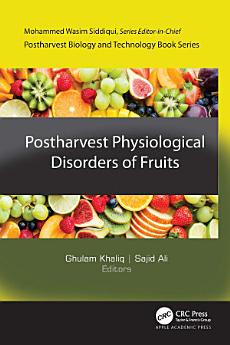Postharvest Physiological Disorders of Fruits
About this ebook
This volume covers important information on the postharvest physiological disorders of fruits that are caused by temperature, rain, humidity, pruning, irrigation, harvest procedures, and nutrient deficiencies. The book details the modern and sophisticated diagnostic methods, management, and technologies to confront these challenges.. The book gives comprehensive explanations regarding the causes for the occurrence of physiological disorder symptoms and the possible mechanisms to control these abnormalities.
Organized by the type of fruits, this volume focuses on the physiological disorders that affect tropical and subtropical fruits that include mango, banana, citrus, pomegranate, litchi, papaya, guava, fig, cashew, etc., and also covers the postharvest physiological disorders of temperate fruits, such as apple, grape, peach, cherry, strawberry, kiwi, persimmon, apricot, and plum.
Key features:
- Provides the most recent advances in understanding the postharvest physiological disorders of fresh fruits
- Reviews the fundamental and innovative technologies for the management of the postharvest physiological disorders
- Covers preharvest factors affecting the postharvest quality of fresh fruits
- Outlines the preharvest and postharvest causes of physiological disorders and handling technologies for the highly perishable fruits
This volume provides informative and practical information that will aid researchers, scientists, industry professionals and faculty and students in the understanding the principles, food safety techniques, and the mechanisms of postharvest physiological disorders for the best management of fresh fruits.
About the author
Ghulam Khaliq, PhD, is Associate Professor/Chairman in the Department of Horticulture at
Lasbela University of Agriculture, Water and Marine Sciences, Uthal, Pakistan. Prior to that, he
was a research associate in the Agriculture and Cooperatives Department of the Government of
Pakistan. His research is focused on postharvest physiology of fruits, vegetables, and ornamental
plants, and he is also working on postharvest technologies such as edible coatings, elicitors,
biopreservative packaging, and the development of novel approaches to maintain quality and
extend the shelf life of highly perishable products. He has executed research projects supported
by the Higher Education Commission of Pakistan and collaborates with other research institutions
around the world. He published research articles, book chapters, conference papers, and reports
in national and international journals and serves as an editor, associate editor, reviewer, and
editorial board member of several international journals. He is a lifetime member of several
scientific societies, including the Pakistan Society for Horticultural Sciences, Pakistan Botanical
Society, and Pakistan Society of Plant Protection.
Sajid Ali, PhD, is Assistant Professor of Horticulture in the Faculty of Agricultural Sciences and
Technology at Bahauddin Zakariya University, Multan, Pakistan. Dr. Ali teaches courses in
undergraduate and postgraduate classes with a major focus on fruit production and postharvest
physiology. His current focus is to improve postharvest quality of fresh horticultural produce with
minimum loss. He worked as a research officer and as a project development officer on two
research projects at the University of Agriculture, Faisalabad, Pakistan. He has won several
research projects. Dr. Ali has authored and co-authored over 100 peer-reviewed international
journal publications and around 25 book chapters. He is an academic editor of Plos One and
review editor of Frontiers in Sustainable Food Systems and Frontiers in Plant Science. He
received advanced training in postharvest physiology of horticultural crops at the US Horticultural
Research Laboratory.




